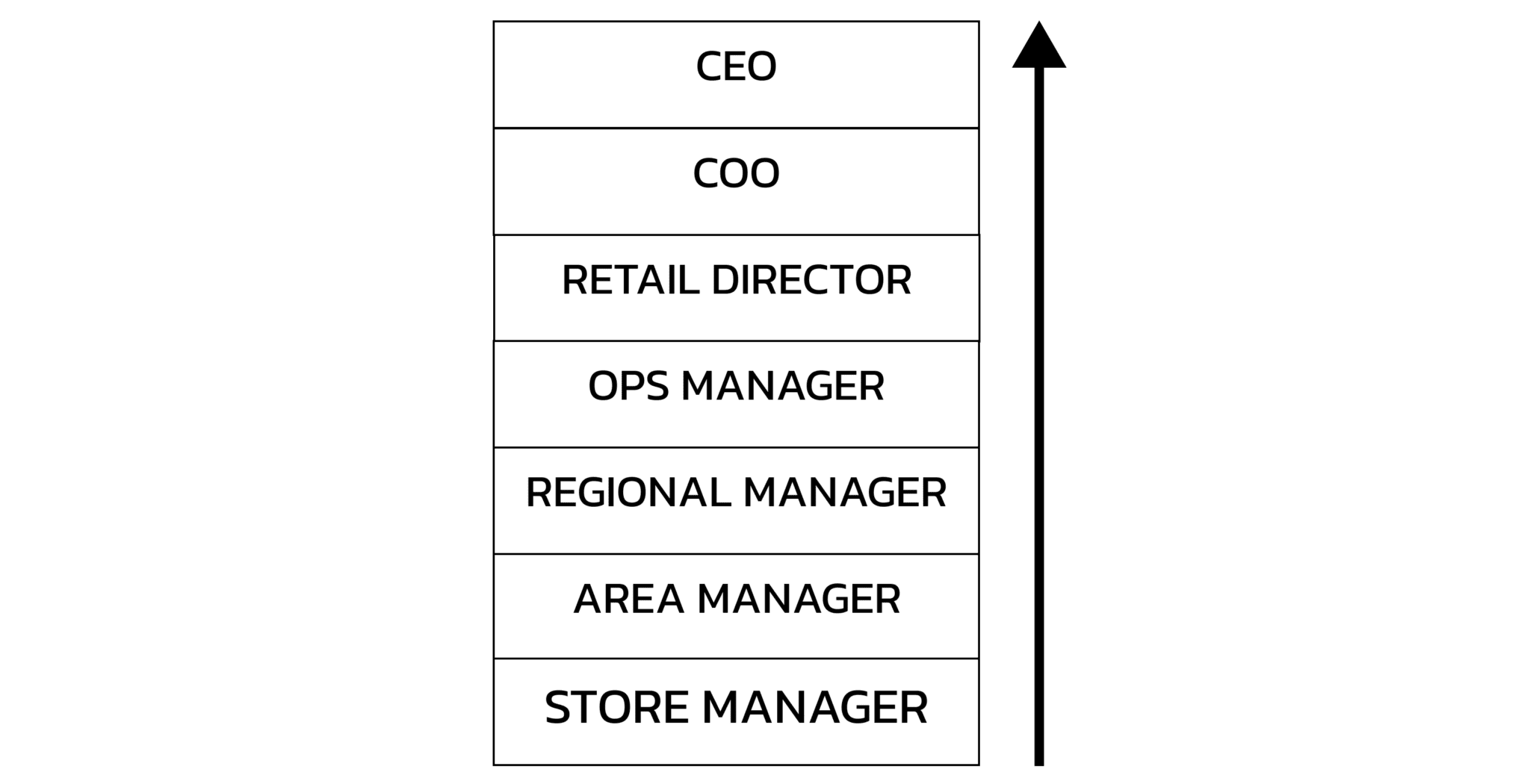How to Progress To Retail Director

A Career Journey
It’s always good to have a plan for what’s next. If your plan is a career in the retail industry, you might already have your sights set on being a store manager. But what comes after that? If you’re looking to climb all the way to the top of the retail career ladder, here’s the ZD Guide for how to do it.
What positions are higher than store manager?
If you’re going to aim for the highest levels of your retail organisation, it’s a good idea to know exactly where you’re aiming.
In most stores, the store manager will be the most senior role for someone with responsibility over a single business unit. Above store manager, and assuming you stay in your current retail ops lane, your next retail management role will involve having authority for multiple stores in a structure that looks like this:

An area manager will take control of a cluster of stores and may have line management responsibility for the store managers on their ‘patch’. Depending on the scale of the organisation, a regional manager may be a further tier of retail management with control of several areas.
An area manager, for example, might have responsibility for the stores in a county, whereas the regional manager may have control of the counties within a region (e.g. the South West, Wales, Scotland etc).
The next step on the ladder, to operations manager, is likely to take you to retail head office. This is a wide-ranging role and responsibilities can vary significantly depending on the size of the organisation. In general, though, this step in your retail career is all about ensuring the company runs smoothly. This may involve resourcing and staffing, budgets and margins, or the design and management of process improvements.
The next move in retail head office will take you to retail director, which ups the strategic nature of your responsibilities, before chief operations/operating officer (COO) and chief executive officer (CEO) roles take you to board level.

How can I progress my career in retail?
As you might imagine, you won’t walk into a retail director role without some serious experience. The knowledge you build as a store manager will certainly help (not least because that’s a wide-ranging role too), but you’ll need to show a broader skillset and track record that demonstrates your ability to drive organisational change and see things from a strategic perspective.
The path we set out earlier isn’t the only route to regional manager. You might build your experience in logistics as a warehouse manager. You might achieve it via a buying or merchandising route. But you will need to make several steps in your retail management career before you reach regional director level, and you should expect the journey to take years (ten as a minimum).
On the plus side, we see career opportunities for retail directors appear frequently, and the wide-ranging nature of the role means it’s relatively easy to build at least some of the skills and experience that will be essential to every role.
How to become a director in retail?
- Build a broad skillset
With one company, the retail director may be expected to focus on expanding retail operations across a certain geographic area. In another, they might be expected to lead the transformation of the digital or customer experience, oversee HR’s role in providing the company with the right talent in the right numbers, or managing company budgets and forecasting.It would be a tough ask to develop lots of experience in all of these, but the similarly broad nature of the store, area, and ops manager roles means you should get plenty of opportunity to develop a breadth of experience, with real depth in some key areas.It’s a good idea to think of the characteristics that all retail directors share – and which most roles require – and focus on getting plenty of experience in those.
They include:
– High-level decision making (that is, making big, strategic calls that prove to be wise moves)
– Leadership – because you’ll probably be responsible for a team of regional or departmental managers who you’ll need to inspire, motivate and direct.
– Technical know-how – if you’re to head up an organisation’s decision making in, for example, data protection, use of AI in e-commerce, or social media, you’ll need to know your subject in serious detail
– Communication, particularly the ability to effectively interact with people up and down the organisational chain to persuade them about a certain course of action
– Finally, the traditional retail-specific skills of being able to work at pace and to multi-task will be more essential than they’ve ever been. - Plan your route There are several ways to reach retail director level, but each will require a slightly different skillset or qualification profile. Choose an ops route to retail director and you may need to augment a degree with leadership qualifications (usually gained as part of your store/area manager development path. Choose a warehouse management route, on the other hand, and you’ll need the supply chain and logistics qualifications to ensure you can advance your retail career. No one route is ‘better’ than another but you do need to understand your own preferences and aptitudes and choose the route that’s a best fit for your skillset.
- Understand the retail landscape There are always career opportunities in retail. But those opportunities aren’t always in the same areas. Twenty years ago, it would have taken a shrewd, forward looking retail manager to see the way retail was shifting to a far more hybrid physical/online world. Looking ahead at the changes retail is likely to face over the next five ten years – and then targeting your development in those areas – will help ensure that when you’re ready for retail director, the vacancies match your capabilities. Ready to take the next step in your career in the retail industry? Talk to us now.
< Back to list


